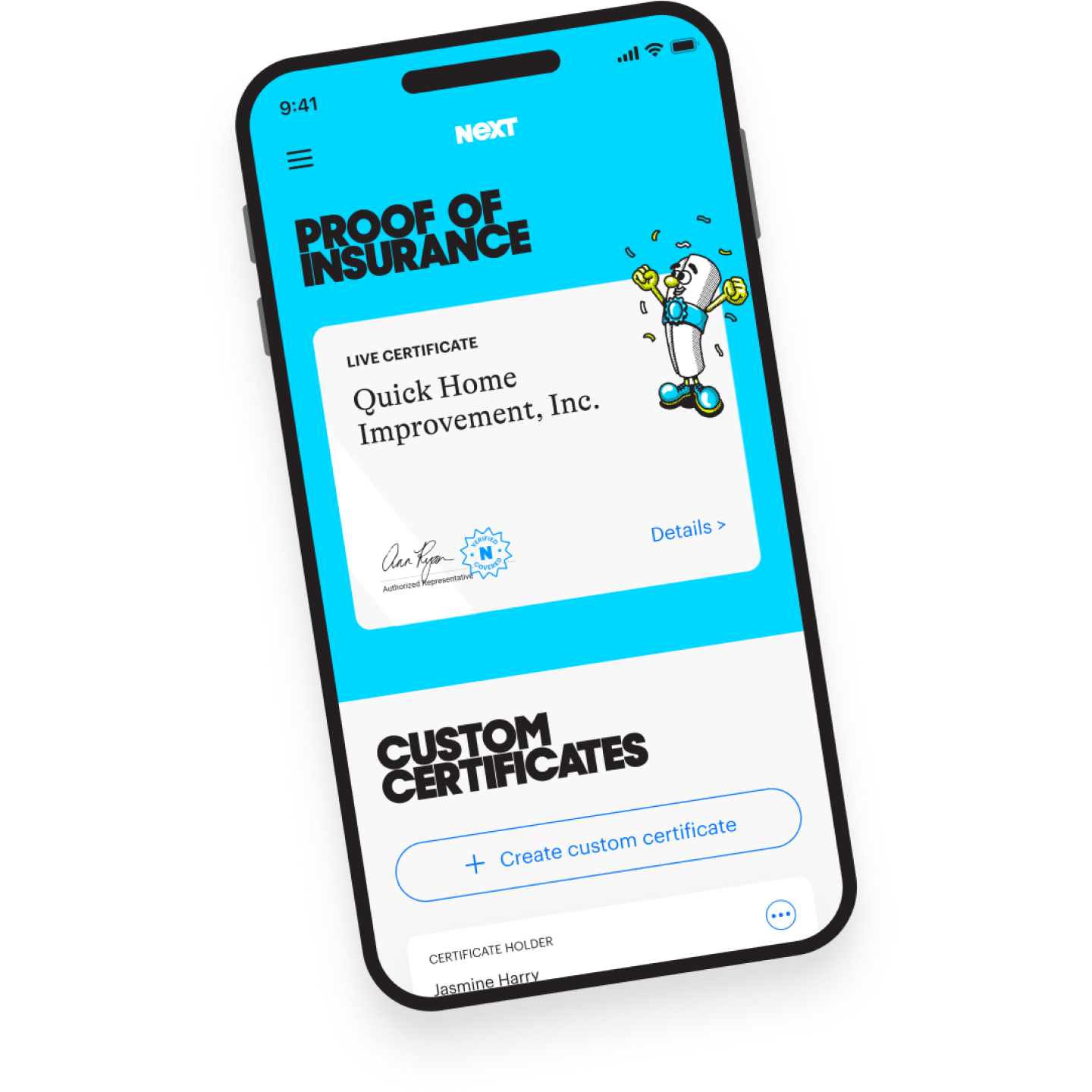E&O insurance can help with the cost of professional errors — even if you’re not at fault. Small business owners can get coverage for:
Business mistakes
A customer says you made a mistake that caused them financial harm.
Accusations of negligence
Someone claims they lost money because your services were negligent.
Missed deadlines
You forget a deadline on a service that negatively impacts your client.
Learn more about Errors and Omissions insurance
E&O insurance, also known as professional liability insurance, can help protect insurance professionals, real estate agents, property managers and other professionals if they’re accused of a mistake that costs a client money.
What is professional Errors and Omissions insurance?
An errors and omissions insurance policy can help provide financial protection for you and your business if someone accuses you of a business mistake, professional negligence or not delivering on client contracts that causes a financial loss or other damages.
For example, E&O insurance coverage could help if:
-
A customer says you made a mistake that caused them financial harm.
-
You miss a deadline while providing a service that negatively impacted your client.
-
Someone claims that they lost money because you were negligent in providing business services.
Regardless of whether an accusation against you is true or not, it will take time and financial resources for you to respond.
Note that an errors and omissions insurance policy, also called a professional liability policy, is different than an errors and omissions add-on to a general liability policy (and yes, we know this can be confusing).
An E&O policy offers coverage for professional business mistakes for many types of businesses. This policy is everything we’ll talk about on this page.
A contractor’s errors and omissions endorsement is an add-on to general liability coverage for contractors and the construction trade. It helps add some protection for workmanship errors that may not be included in a standard general liability policy.
What does E&O business insurance cover?
E&O business insurance could help pay for legal defense costs, damages and legal judgments if your business is accused of work errors or incomplete projects that cause a client to lose money.
Errors and omissions insurance may also provide coverage for:
-
Disciplinary proceedings. Costs to defend yourself in cases brought against you by a professional review board or licensing organization.
-
Crisis management. Expenses for retaining a public relations firm after an accusation of professional negligence.
-
Subpoena assistance. Costs to produce documents and testify in response to a subpoena.
Small business errors and omissions insurance (E&O insurance) can help protect you with associated costs up to your policy limit. And it can help to avoid disruption to your business.
Is Errors and Omissions liability coverage legally required?
An errors and omissions policy could be required for some professional certifications and contract requirements.
However, it can depend on your profession and the state where you do business.
E&O coverage from NEXT is most sought after by:
For example, a real estate agent might need to buy a real estate E&O policy and provide a certificate of insurance before signing on with a broker. Insurance agents often need to have coverage before they can work with an insurance carrier or agency.
Even if it’s not required, most businesses that provide a service or offer professional advice can benefit from the protections of E&O. It can protect you from financial losses and it lets clients know that they may be protected if you make a mistake. This can help build trust and instill confidence in you and your employees.
How much does Errors and Omissions insurance cost?
The price of E&O insurance varies based on a number of factors, including:
Your exposure to risk
Businesses with more exposure to risk typically pay higher rates for E&O insurance coverage than low-risk businesses.
Your claims and insurance history
A history of insurance claims or canceling your policies early may lead to higher business insurance rates.
Your coverage limits and insurance package
Higher coverage limits — the amount you or someone else would receive after a claim — usually means a higher monthly or annual premium.
With NEXT, you can save 10% on insurance costs by bundling your E&O coverage with another business insurance policy, such as general liability insurance, workers’ compensation insurance or commercial auto insurance.
Start a free quote to see the exact price you’ll pay for E&O.
How is E&O coverage different from Professional Liability insurance?
Errors and omissions insurance and professional liability insurance both offer the same coverage.
Although they go by different names, professional liability and errors & omissions insurance (an E&O policy) can both help protect you if you’re accused of making a professional error that leads to a financial loss for a client.
The name can differ depending on your industry.
-
Professional liability coverage is usually the choice for accountants, consultants, engineers and architects.
-
Errors & omissions insurance is the professional standard for real estate and insurance agent professionals.
How do I get an E&O policy with NEXT?
NEXT specializes in small business insurance. You can get a quote, buy errors and omissions coverage 100% online and get your proof of insurance in about 10 minutes.
We’ll ask you some basic questions about your business and operations, including:
-
Your industry
-
Where you do business
-
How many years you have owned the business
-
Number of employees
-
Expected annual revenue
-
Recent insurance and claims history
After you share your information, you’ll have instant access to a customized insurance quote for E&O and other recommended coverage.
If you like what you see, adjust the package limits and make your purchase. You’ll be insured immediately after payment.
Errors and Omissions Insurance (E&O) FAQ
Learn about errors and omissions insurance coverage with more frequently asked questions about our coverage.
Our licensed, U.S.-based insurance advisors are ready to help if you have additional questions.
When you’re ready to explore coverage options for your business, you can get an instant quote online and purchase insurance within a few minutes.
Does E&O insurance cover my subcontractors or employees?
Your employees are covered by your E&O policy — but only for the professional services they deliver for your business.
For example, if you own a real estate business and one of your employees sells a house with radon gas exposure, they could be covered if the person who buys the house decides to sue for failing to disclose this defect.**
Your contractors may be covered but it depends on the details of your specific policy.
If I already have General Liability insurance, can I add E&O insurance to my policy?
Yes, NEXT offers up to a 10% discount when you add an E&O policy to your general liability insurance policy or any other existing policy.
You can add E&O insurance directly through your online customer account.
Do real estate brokers need to carry Errors and Omissions insurance?
The rules for real estate brokers vary state to state. Check with your local real estate governing agency for the most up-to-date regulations.
Real estate E&O insurance is required in these states:
-
Alaska
-
Colorado
-
Iowa
-
Idaho
-
Kentucky
-
Louisiana
-
Mississippi
-
Montana
-
Nebraska
-
New Mexico
-
North Dakota
-
Rhode Island
-
South Dakota
-
Tennessee
Even if you don’t practice real estate in one of these states, E&O insurance could help your business. If you do face legal trouble, E&O insurance may help pay for your defense fees and judgments (up to your policy limits).
Will E&O insurance cover me if it’s my fault?
Errors and omissions insurance is designed to provide coverage for your mistakes, even if you are found to be at fault. Unintentional negligence or honest mistakes are why E&O policies exist.
Note: You will not be covered for intentional or criminal acts.
Do you offer prior acts coverage?
Depending on your industry, we may provide prior acts coverage for businesses that have maintained continuous E&O coverage at similar or higher limits since the requested retroactive date.
This means that if you first report an E&O claim related to negligent acts in the past during your policy period with NEXT, you still may be covered.
Can I add an additional insured to my E&O policy?
All NEXT policies include the ability to automatically add an additional insured.
If you have a contract in place with another person or company requiring you to list them as an additional insured on your insurance policy, they may be automatically covered under your NEXT policy.
Depending on your industry, you can also add a specific person or company to your certificate of insurance from your online customer account.
How do I file an E&O claim with NEXT?
If you’re a NEXT customer, you can file a claim online or via the NEXT app. After we receive your claim, we’ll call you to go over the details.
If you’re not a NEXT customer, you can report a claim in our help center.
File your claim as soon as possible, and be sure to have documentation nearby.
NEXT Insurance reviews
It was great for me
It really was so simple and easy. Actually easier than the old way, going through an agency. They actually update the info immediately.
Lance R.
Next new thing
I like Next insurance because my e and o insurance cost is quite reasonable, the application process is short, and the certificate is available right away.
RENNELL G.
So dang easy
Super easy process. I have a million irons in the fire trying to launch my business; NEXT made it so easy to get the insurance I need to win new clients. The price was great too.
Andrew R.
Easy and awesome
So simple and easy to use
Levi P.
Fantastic
Easy website to navigate. Great follow up even after the sale.
Debbie D.
Great!
Hassle free and great to work with. Affordable.
Anthony G.
Fast service
"Lightning fast" coverage!
Ted H.
Excellent
I have signed up for Next Insurance and it has been easy to navigate, wonderful for small business. Thank you
Stanley M.
The best service.
Thanks for your help with my needs, I'm very grateful for your assistance and help. I will recommend your company to others
JOEL C.
Online Insurance in minutes!
Next is great. Fast easy website, so easy to pick my personal preferences for coverage. Able to pay online..and recieve your COI immediately. Your Great Next!
Travis M.












